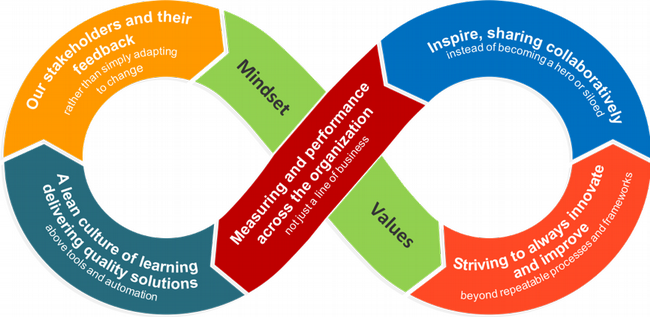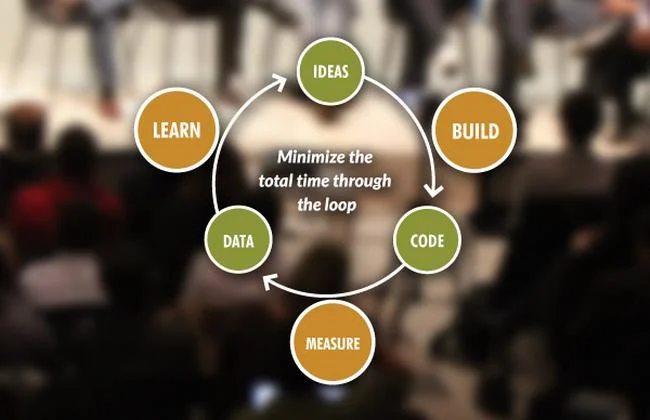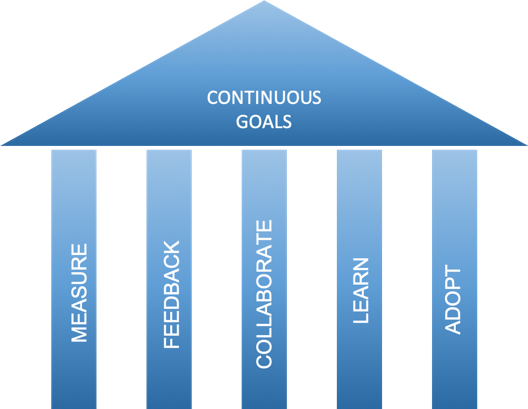8.4 KiB
5 essential values for the DevOps mindset
People and process take more time but are more important than any
technology "silver bullet" in solving business problems.

Many IT professionals today struggle with adapting to change and disruption. Are you struggling with just trying to keep the lights on, so to speak? Do you feel overwhelmed? This is not uncommon. Today, the status quo is not enough, so IT constantly tries to re-invent itself.
With over 30 years of combined IT experience, we have witnessed how important people and relationships are to IT's ability to be effective and help the business thrive. However, most of the time, our conversations about IT solutions start with technology rather than people and process. The propensity to look for a "silver bullet" to address business and IT challenges is far too common. But you can't just buy innovation, DevOps, or effective teams and ways of working; they need to be nurtured, supported, and guided.
With disruption so prevalent and there being such a critical demand for speed of change, we need both discipline and guardrails. The five essential values for the DevOps mindset, described below, will support the practices that will get us there. These values are not new ideas; they are refactored as we've learned from our experience. Some of the values may be interchangeable, they are flexible, and they guide overall principles that support (like a pillar) these five values.
1. Feedback from stakeholders is essential
How do we know if we are creating more value for us than for our stakeholders? We need persistent quality data to analyze, inform, and drive better decisions. Relevant information from trusted sources is vital for any business to thrive. We need to listen to and understand what our stakeholders are saying—and not saying—and we need to implement changes in a way that enables us to adjust our thinking—and our processes and technologies—and adapt them as needed to delight our stakeholders. Too often, we see little change, or lots of change for the wrong reasons, because of incorrect information (data). Therefore, aligning change to our stakeholders' feedback is an essential value and helps us focus on what is most important to making our company successful.
Focus on our stakeholders and their feedback rather than simply changing for the sake of change.
2. Improve beyond the limits of today's processes
We want our products and services to continuously delight our customers—our most important stakeholders—therefore, we need to improve continually. This is not only about quality; it could also mean costs, availability, relevance, and many other goals and factors. Creating repeatable processes or utilizing a common framework is great—they can improve governance and a host of other issues—however, that should not be our end goal. As we look for ways to improve, we must adjust our processes, complemented by the right tech and tools. There may be reasons to throw out a "so-called" framework because not doing so could add waste—or worse, simply "cargo culting" (doing something with of no value or purpose).
Strive to always innovate and improve beyond repeatable processes and frameworks.
3. No new silos to break down silos
Silos and DevOps are incompatible. We see this all the time: an IT director brings in so-called "experts" to implement agile and DevOps, and what do they do? These "experts" create a new problem on top of the existing problem, which is another silo added to an IT department and a business riddled with silos. Creating "DevOps" titles goes against the very principles of agile and DevOps, which are based on the concept of breaking down silos. In both agile and DevOps, teamwork is essential, and if you don't work in a self-organizing team, you're doing neither of them.
Inspire and share collaboratively instead of becoming a hero or creating a silo.
4. Knowing your customer means cross-organization collaboration
No part of the business is an independent entity because they all have stakeholders, and the primary stakeholder is always the customer. "The customer is always right" (or the king, as I like to say). The point is, without the customer, there really is no business, and to stay in business today, we need to "differentiate" from our competitors. We also need to know how our customers feel about us and what they want from us. Knowing what the customer wants is imperative and requires timely feedback to ensure the business addresses these primary stakeholders' needs and concerns quickly and responsibly.
Whether it comes from an idea, a concept, an assumption, or direct stakeholder feedback, we need to identify and measure the feature or service our product delivers by using the explore, build, test, deliver lifecycle. Fundamentally, this means that we need to be "plugged into" our organization across the organization. There are no borders in continuous innovation, learning, and DevOps. Thus when we measure across the enterprise, we can understand the whole and take actionable, meaningful steps to improve.
Measure performance across the organization, not just in a line of business.
5. Inspire adoption through enthusiasm
Not everyone is driven to learn, adapt, and change; however, just like smiles can be infectious, so can learning and wanting to be part of a culture of change. Adapting and evolving within a culture of learning provides a natural mechanism for a group of people to learn and pass on information (i.e., cultural transmission). Learning styles, attitudes, methods, and processes continually evolve so we can improve upon them. The next step is to apply what was learned and improved and share the information with colleagues. Learning does not happen automatically; it takes effort, evaluation, discipline, awareness, and especially communication; unfortunately these are things that tools and automation alone will not provide. Review your processes, automation, tool strategies, and implementation work, make it transparent, and collaborate with your colleagues on reuse and improvement.
Promote a culture of learning through lean quality deliverables, not just tools and automation.
Summary
As our companies adopt DevOps, we continue to champion these five values over any book, website, or automation software. It takes time to adopt this mindset, and this is very different than what we used to do as sysadmins. It's a wholly new way of working that will take many years to mature. Do these principles align with your own? Share them in the comments or on our website, Agents of chaos.
Can you really do DevOps without sharing scripts or code? DevOps manifesto proponents value cross-...
via: https://opensource.com/article/19/5/values-devops-mindset
作者:Brent Aaron Reed 选题:lujun9972 译者:译者ID 校对:校对者ID


